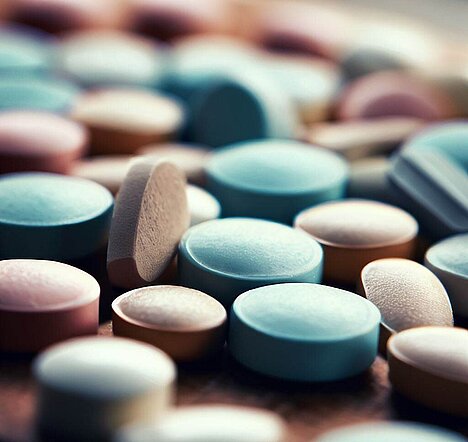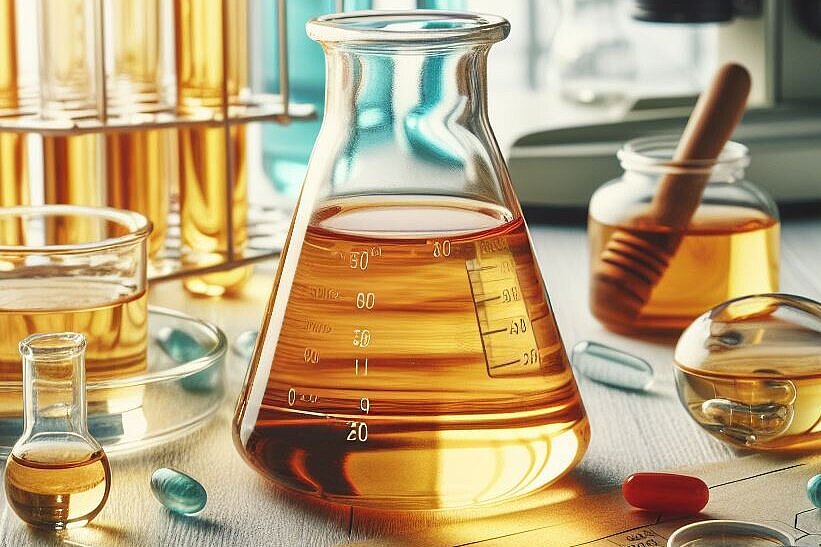DL-methionine

What is DL-methionine?
Methionine is an essential, sulphur-containing amino acid that dogs cannot produce themselves and must therefore obtain from their diet. Methionine is important for the formation of proteins, the methylation of various compounds and the detoxification of the body. Methionine is mainly found in animal products such as meat, fish or eggs, but also in some plant sources such as Brazil nuts or soy.
DL-methionine is a synthetically produced form of methionine, which consists of a mixture of the natural (L-) and the artificial (D-) amino acid. DL-methionine is used as an additive in many dog foods to increase the methionine content or to lower the urine pH.
Why is DL-methionine added to dog food?
There are several reasons why DL-methionine is added to dog food. One reason is that many dog foods have a low meat content and therefore do not contain enough natural L-methionine. DL-methionine is added to cover the need for this essential amino acid. Another reason is that the natural L-methionine is partially destroyed by the processing of the feed (e.g. heating) and is therefore less available. Here too, DL-methionine can help to compensate for the loss.
Another reason for adding DL-methionine is to acidify the urine. DL-methionine has the property of shifting the urine pH value into the acidic range. This can be useful in some dogs to promote the formation or dissolution of certain urinary stones. Struvite stones are a common form of urinary stone in dogs that are composed of magnesium ammonium phosphate and form when the urine pH is alkaline. Acidifying the urine with DL-methionine can dissolve these stones or prevent them from forming again.
What are the benefits of DL-methionine in dog food?
The use of DL-methionine in dog food has several advantages, which can vary depending on the situation and the dog's needs. One advantage is that DL-methionine is a cost-effective and practical way to increase or maintain the methionine content in the feed. This can be particularly important in feeds with a low meat content or a high degree of processing in order to ensure an adequate supply of this essential amino acid.
A further advantage is that DL-methionine is an effective means of lowering urine pH and thus preventing struvite stones. This can be helpful in dogs prone to this type of urinary stone to prevent or treat pain, inflammation or infection of the urinary tract. In addition, DL-methionine can also help reduce urine odor.
What are the disadvantages of DL-methionine in dog food?
DL-methionine in dog food also has some disadvantages, which must also be taken into account depending on the dog's situation and needs.
On the one hand, it can lead to hyperacidity of the blood with symptoms such as weakness, vomiting, respiratory distress and coma. Secondly, it can impair the absorption of other important nutrients such as zinc, iron and vitamin B6. It can also disrupt the dog's natural intestinal flora and lead to digestive problems such as diarrhea, flatulence and inflammation.
DL-methionine is an essential amino acid that dogs need to ingest in their diet. It is often added to dog foods as an additive to increase the methionine content, especially in foods with a low meat content or after the food has been processed. DL-methionine can also lower urine pH and therefore be useful in the prevention of struvite stones. The advantages of DL-methionine are its cost-effectiveness and help with urinary stone problems. However, disadvantages can include acidification of the blood, impaired nutrient absorption and digestive problems.
Properties 3
Are you looking for other ingredients with a specific property?
Just click on them to find more.
If you notice any signs of hypersensitivity or poisoning in your dog, you should see your vet immediately. We are not a substitute for a vet, but we try to be as accurate as possible. Every dog reacts differently and we recommend you get a second opinion or consult your vet if in doubt.
Stay healthy and take good care of your four-legged friend!😊
Similar to DL-methionine
Lysine is one of ten essential amino acids for dogs. This means that dogs cannot produce this amino acid themselves, but must obtain it from their diet. Amino acids are the building blocks of...
Threonine is an essential amino acid, which means that it is vital for the body but cannot be produced by the body itself. It must therefore be obtained from food. Threonine plays a central role in...
Tryptophan is one of the essential amino acids that the body needs for various biological processes but cannot produce itself. It must therefore be obtained from food. Tryptophan is a precursor for...
Arginine is an amino acid that is involved in the formation of proteins. Proteins are the building blocks of life and fulfill many important functions in your dog's body. Arginine is an essential...


